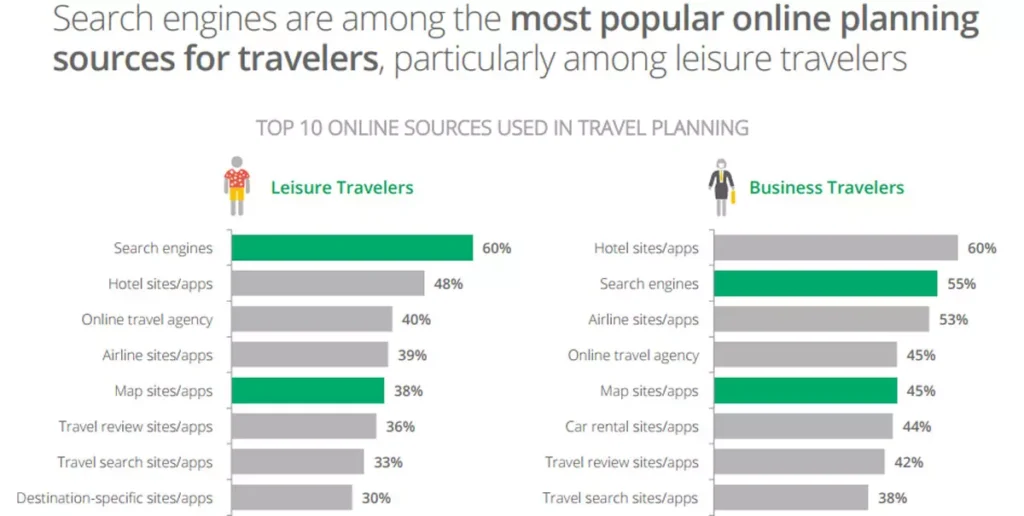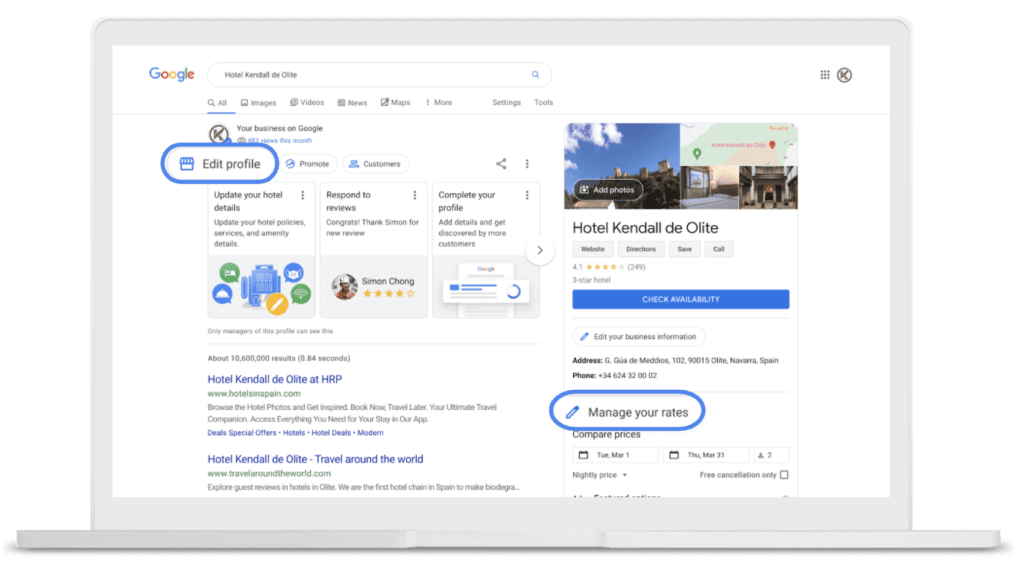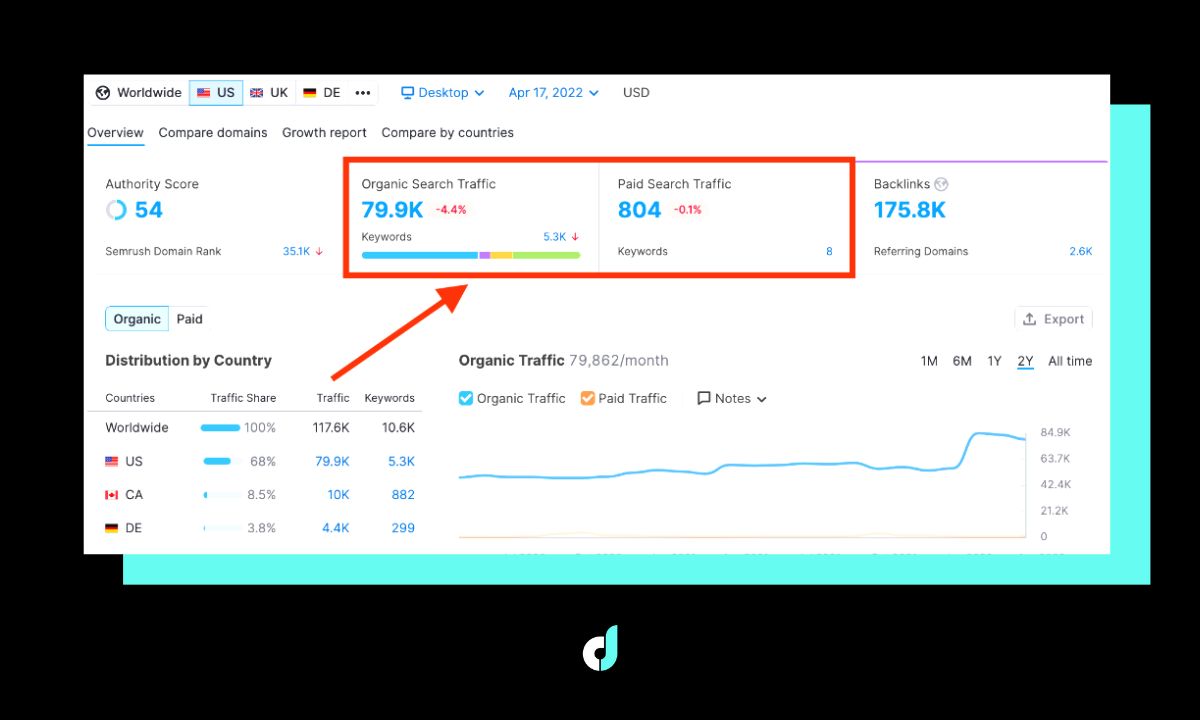Did you ever have to book a hotel for a destination wedding, only to realize that the hotel you were asked to book isn’t on the first page of search results? It can be frustrating to dig around for a specific venue.
It can be a serious shlep for a casual searcher. Do you know what’s even more frustrating than having to go to Page 4 on Google to find your hotel?
Being the hotel owner whose venue is hidden by search results. Imagine having an incredible hotel that has all the hottest amenities, only to find out that no one even knows you exist. It can happen to great resorts—and it has happened in the past!
Sadly, a lot of great hotels end up losing out on paying customers as a result of not having good search engine practices. That might even be you right now. If you want to change that for the better, you need to know how to do hotel SEO. Don’t worry, we have the guide here!

What is SEO, and how is it different for hotels?
SEO stands for “search engine optimization.” It’s a series of practices and protocols that help your website become easy to find by search engines. When SEO is done well, your site will climb to the top of search engine results.
Hotels deal with a lot of competition from travel sites, booking agencies, and corporate-run websites. If you are an independent hotel, you have to overcome and outdo all of those groups to get to the top of search engine results.
If we’re honest, the deck is often stacked against small indie hotels because there is so much competition among hotels.
Let’s just face it. No one wants to have to pay the painfully high fees associated with advertising on booking sites. SEO is the best alternative.
Doing SEO well includes a wide range of steps, including:
- Keyword research
- Creating content around those keywords
- Building backlinks that encourage web crawlers to index and rank your site (which we will discuss next).
It’s a marathon, so it will take time for you to see results. To learn more about Hotel’s SEO, check out our guide on Why do hotels need SEO
What makes hotel SEO different?

It’s important to remember that hotel SEO isn’t just about picking out keywords. It’s about knowing the intention behind the target audience you want to get. Hotels are rented out for different reasons.
Hotels and other travel destinations require special care when it comes to user-generated content, photography, videos, and ratings sites. People tend to take photos and link to venues’ social media accounts. This can help build backlinks.
As search engine crawlers continue to increase their consideration of social media, it’s important to make sure you have an active social media presence. Google and other search engines index social media sites.
In many cases, people will check a hotel’s social media or reach out for help through Facebook or Instagram. If your hotel doesn’t have a social media presence, you’re missing out on new leads and having multiple results pointing back to your site.

Are your clients. looking for romantic getaways? A budget travel spot? Something Instagram-worthy? You know your hotel better than Google does, so it’s best to gear your marketing toward what people seek out in your venue.
What are the benefits of SEO for hotels?
It’s fairly simple. SEO is a major investment with major returns:
- You get long-term results that get you to the top of the search engine results page. The majority of travelers book hotels via a Google search. Without SEO, those travelers won’t know your hotel exists.
- SEO means you don’t have to spend as much on ads to retain visibility. Advertising is always going to be an expenditure, but SEO means you won’t have to keep paying for ads just to get visibility on the search engine of your choice.
- Your results last longer than they would with other forms of marketing. SEO, once it’s established the correct way, lasts for months or even years. Younger generations, particularly Millennials, prefer to book with travel sites. SEO makes it easier to win them over by simply being the first site they see.
Do hotel franchisees need to worry about SEO?
If you own a hotel in a franchise, then you probably already have the majority of your SEO done by corporate. However, that doesn’t mean you can’t add your own personal twist to your SEO campaign—at least, on social media. It can’t hurt to boost their efforts!
How to do hotel SEO the right way
It’s the mid-2020s, and that means that what worked in 2010 will not work now. These tips and tricks will ensure your SEO game is up to date.
1. Register your hotel on Google Places and Google Travel.
This is the easiest way to get Google to index your website, show your hotel’s location, and streamline your booking process. Google Places is pretty easy to sign up for. You just have to fill out the form on Google Business and follow their instructions.
You can also enroll in Google Travel, which allows you to get direct bookings. This is generally done as an offshoot of Google Business. Since you will be getting a Google account, you can verify your business. Once Google recognizes it’s a hotel, you’ll have the option of booking through Google.
Take that option.

The analytics you get through Google are great. If you take a look at the Google Travel Analytics page, the reason why you want to sign up becomes clear. It makes it easy to see how you’re doing compared to competitors. Oh, and it also keeps tabs on travel trends.
When you have a better idea of what other people are doing, it’s easier for you to get competitive. For example, if you find out that your area has a “surprise surge” of travel in February, you might want to consider offering special Valentine’s Day packages because travelers will be searching for that during that month.
2. take great photos and videos.
Written content matters, but most travelers are looking for a place that looks good, too. Instagram and Facebook both demand photos. They increase interaction, boost engagement on social media, and encourage people to link back to your site.
Photos of your hotel have multiple uses: social media posts, alt text indexing, caption indexing, and general marketing work. A picture can absolutely say a thousand words.
Are your pics telling the right story?
PRO TIP – Make sure to post some videos to YouTube under your Google account, and add a search-friendly name. This can easily launch your site to the top of search engine results. Over 68 percent of all searchable YouTube videos can be found at the top of the first page, so this is a move that just makes sense.
Take a look at a stunning 4 bedrooms villa resort video in Bali to see what I mean.
3. link to your site on social media.
Back in the day, social media marketing and SEO were two different types of marketing. Today, they go hand in hand. You need to have a strong social media campaign to rank well on Google. Social media is also the birthplace of user-generated content.
Take hold of your social media with both hands. Post well, post frequently, encourage visitors to tag your location, and make sure your social media handles are all linked together. A higher social media following translates into better SEO rankings.
Speaking of, you need to get a lot more content than you have on your site now.
On the internet, content is king. High quality content that provides value to your potential customers is exactly what people want to see. It’s also what Google looks for. Take a look at your hotel’s website. Does it offer valuable information for people who want to book a room?
In the world of SEO, blog posts make a huge difference. However, you shouldn’t stop at a blog post or two. You need the whole enchilada—videos, blog posts, social media posts, and photos of your venue.
4. Go local and go niche.
Travelers tend to search for hotels based on two main factors: niche and location. Use that knowledge to your benefit. Do some keyword research that is local and niche-oriented! These keywords are generally easier to work with than more generic keywords.
Your targeted SEO keywords should include your state, the closest city to you, and your local town. In bigger cities (such as New York or Dallas), you might also want to mention the specific neighborhood your hotel is located in.
The next topic is getting your hotel’s niches covered. Your niches can include amenities, ambiance, and specific occasions that your hotel tends to cater to. Examples of good niches to mention include…
- Romantic getaway hotels
- Hotels for honeymoons
- Cheap hotels
- Hotels with a spa
- Family-friendly hotels
- Pet-friendly hotels
PRO TIP – When you are trying to figure out what extra keywords to add to your SEO strategy, go through every amenity you have. Then, get photographs of that amenity while you make new content for your site.
The photos of those amenities can be named in an SEO-friendly way, for example: “the-royalton-breakfast-bar.jpg.” They also can be used in your social media posts for a double-dip on content.
Hotel SEO requires link building, so consider reaching out to other publications.
Link building is one of the primary ways that website crawlers discover your page. This can happen one of two ways: onsite or offsite link building. With link building, you can’t just do onsite linking or offsite linking. You have to have a mix of both, with an emphasis on offsite linking.
Onsite linking versus offsite linking
Onsite linking
Onsite link building requires you to link your site’s pages together to make them easier for crawlers (and users) to navigate two. For example, linking a blog post to a page with your hotel’s latest specials is a good example of onsite linking.
The point of onsite linking is to build a path for crawlers to navigate and discover your page. A good rule of thumb is that you should have at least three onsite links on every page that you have.
Offsite linking
Offsite linking requires you to get authoritative websites to post links to your website. A lot of this can be done by social media and review sites like Yelp, but it’s often not enough. Hotels in larger cities might want to do media outreach to build up those links.
Doing this can be pretty easy. You can hire a PR manager to get you press with a link back to your hotel or you can approach local journalists to cover your hotel. Doing this is simple, since most journalists are on Muckrack, X(Twitter), Help a Reporter Out, or Cision.
These platforms allow you to contact reporters in need of a good story. As long as you are friendly and upfront about your intentions, you have a good chance of getting free news coverage.
Another way to get more offsite linking is to use your social media pages to post links to your website. It’s simple, but the authority that comes with social media makes it easier for those links to make an impact.
5. Keep an eye on hotel ratings.
While this is not a concrete rule across the board, it’s worth noting that hotels with high client ratings tend to do better in search results. This is often because Google tries to encourage users to choose premium, high-quality services so that people remain happy about their search results.
As an aside, you really should sign up and claim your hotel on most major rating and travel sites. This includes Travelocity, Yelp, Google Places, and Trip Advisor.
6. Encourage your guests to post, link, and refer others to your site.
User-generated content, including reviews and tours of your place posted to social media, will always matter. 76 percent of all travelers will post their vacation photos to Facebook or other social media. If you want to capitalize on it, encourage them to tag you.
7. Keep a mobile-friendly website.
According to Travelperk, 83 percent of all travelers will be doing their travel research on a mobile device. If you don’t have a website that works on mobile devices, you’re missing out on that demographic.
More importantly, Google’s algorithm prioritizes websites that have mobile-friendly devices. So, it’s a double-win. In most cases, what you want to do is get a site that’s “mobile-responsive,” which means that it will change size and dimensions to suit mobile users.
Most site owners choose to hire someone who can turn their site into a mobile-responsive site. If you don’t want to go that route, you will need to add this meta tag to all your pages:
<meta name=”viewport” content=”width=device-width, initial-scale=1.0″>
This toggles the viewport command, which gives your browser instructions on how to present your site based on the type of view you have. You also will have to learn how to scale your photos or even use tags to remove features to make your site more mobile-friendly.
If you choose to go the DIY route, this website offers pointers that make it easier.
Important tools every hotel owner should use in SEO
This is a lot of work to do, especially from scratch. Thankfully, the internet has a ton of tools you can use to make SEO easier. These include…
- SEMRush. This is one of the best keyword planning tools on the market. You can find out which keywords are the best to target for your hotel, how your hotel performs, and even get a basic outline of SEO-ready work.
- YouTube. YouTube is a woefully underrated way to get your hotel to the top of search results. Most hotels do not have a YouTube channel. Just having a channel with a walkthrough tour of your hotel’s amenities can work to your advantage.
- Canva/Photoshop. Photos need touch-ups. To get the most out of your content production, use an app like Canva or a program like Photoshop to bring out the best in your hotel.
- Google Keywords. This is actually part of the Google Ads suite. Just in case you want to see how much ads would be or how to research keywords.

Request a Custom SEO Analysis
no Risk, No Commitment
Wrap up
If you have a hotel website, you can’t just let it languish on the proverbial shelf. You need to make it discoverable by Google—and that takes work. Between link building, keyword-rich content creation, client outreach, and signing up for review sites, you have your work cut out for you.
DIY SEO is doable, but it’s a legit task. Because it takes so much time and effort, it’s often best to hire someone to do it for you. As long as SEO gets done, you’ll be able to reap the rewards of it.


